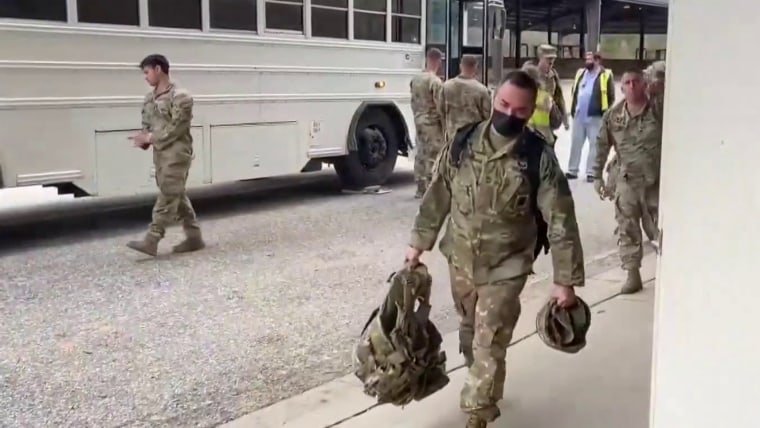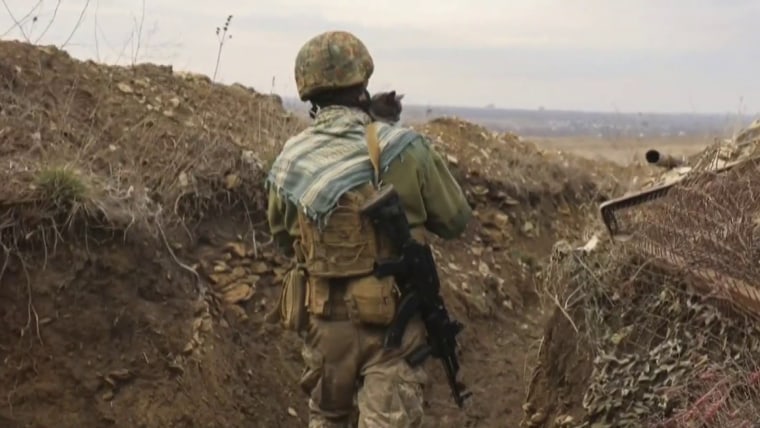US and European warnings of a possible Russian military attack on Ukraine may have stalled an invasion for now, but the remarks have also caused collateral damage to Ukraine’s economy, Kiev officials and experts say.
President Volodymyr Zelensky last week blamed war talks by the US and other foreign partners for scaring off investors and triggering a 10 percent drop in the country’s currency. However, US and Western officials believe the warnings have helped alert the world to the danger posed by Russia’s troop buildup and that Moscow’s threatening actions are to blame for any market turbulence.
“This is a new way to prevent aggression — unveil the Kremlin’s plans before it does anything,” said Hlib Vyshlinsky, executive director of the Kyiv-based think tanks Center for Economic Strategy.
“However, the constant stream of frightening predictions and warnings about Ukraine is having a negative impact on our economy,” he said.
The currency of Ukraine has fell has increased in value since the troop build-up in recent months. On Jan. 28, it was trading at 28.6 against the January US dollar, near a record low.
Foreign investors have also divested Ukrainian bonds, raising their interest rates to about 25 percent and making it almost impossible for the government or private companies to borrow money in international markets, said Anders Aslund, a senior fellow at the Stockholm Free World Forum.
Zelenksyy’s government has had to draw on foreign exchange reserves to prop up the hryvnia and is now seeking financial support from the US and other governments to prevent further damage.
Ukraine’s Finance Minister Serhiy Marchenko suggested this week that the US could do so sign Bonds issued by the government in Kiev because of the prohibitive cost of borrowing on the international markets.
Mykhailo Podolyak, an adviser to Zelenskyi’s chief of staff Andriy Yermak, told NBC News that Russia’s “escalating threats” and other measures appear partly aimed at undermining Ukraine’s economic stability and that international aid could help protect Ukraine’s economy.
“Concrete steps to support Ukraine could be a quite logical response from Western partners, especially through the mechanism of loan guarantees and adequate funding both at the bilateral level and at the level of international institutions,” Podolyak said.
The Biden administration is considering providing financial assistance to Ukraine beyond the half billion dollars it gave to development and humanitarian assistance last year, a White House National Security Council spokesman said.
“We are looking for additional macroeconomic support to help Ukraine’s economy in the face of pressures stemming from Russia’s military buildup,” the spokesman said without giving further details.
Unlike in 2014, when Russia invaded and conquered Crimea, Ukraine’s economy is better able to withstand the pressure on its currency and bonds. According to Aslund and other experts, it has built up a foreign exchange reserve cushion of $31 billion, the highest in a decade, and is running manageable fiscal and current account deficits.
The European Commission on Tuesday announced plans for a $1.35 billion aid program to Ukraine through long-term loans, and the UK government said it plans to allocate a further $120 million in foreign aid to Kiev. Ukraine can also draw on funding from the International Monetary Fund under a financing program agreed last year.
Recent pledges from European partners have helped calm the currency market in recent days, Zelenskyy said in a joint news conference with Dutch Prime Minister Mark Rutte on Wednesday.
Podolyak said statements suggesting a Russian invasion were unlikely to be helpful and that “decisions about the departure of some embassy staff and advice from some foreigners to leave Ukraine were also clearly premature and excessive.”
The US and UK last month ordered the families of their embassy staff to leave Ukraine, a move that angered officials and members of Ukraine’s parliament.
Danylo Hetmantsev, a deputy from Zelenskyi’s Servant of the People party, criticized the evacuation of staff from some foreign embassies, saying it helped scare financial markets. He also questioned why Western governments showed a much less dramatic response when Russia massed troops at the border last year.
“Why were our partners silent in April when we had the same number of troops on the borders?” he said.
But Podolyak said financial markets appeared less volatile this week after the Biden administration toned down its “panic rhetoric” and the two administrations synchronized their approach.
Former US diplomats said the Biden administration had not been reckless in warning of the dangers of Russia’s buildup and that denouncing Moscow’s actions was crucial, even if it meant causing temporary damage to Ukraine’s economy.
“I can only speak for our intent and our responsibility, and we believe it is important to speak openly and honestly about the threat posed by Russia,” White House press secretary Jen Psaki said Monday.
Government officials also say they believe it is vital to expose any fabricated subterfuge hatched by Moscow to justify possible military aggression rather than wait until it is too late.
The government said Thursday it had information about a Russian plan to fabricate a pretext for an invasion of Ukraine using a fake video featuring actors.
State Department spokesman Ned Price said the US had released information about a plan to “expose Russia’s destabilizing actions towards Ukraine and dissuade Russia from pursuing this dangerous campaign and ultimately launching a military attack.”
However, the White House on Wednesday acknowledged that it had adjusted its language when describing the possibility of a Russian military offensive in Ukraine.
“We stopped using it because I think it sent a message that we didn’t want to send, which is that we knew President Putin had made a decision,” Psaki told reporters.


